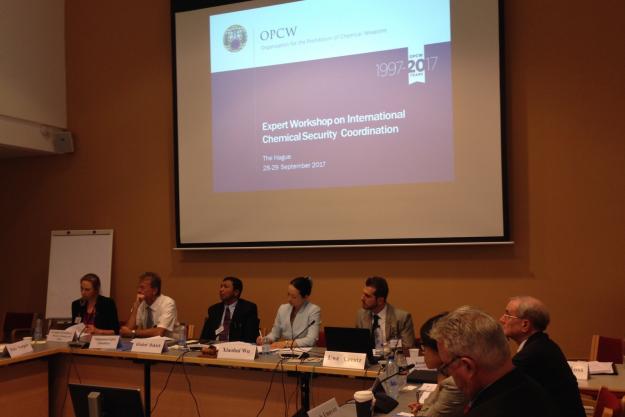
Participants at an expert workshop to discuss chemical security, which was held at OPCW headquarters on 28 and 29 September 2017.
THE HAGUE, Netherlands — 4 October 2017 — Against the backdrop of growing international concerns about chemical terrorism, the Organisation for the Prohibition of Chemical Weapons (OPCW) has convened an expert workshop to discuss chemical security. International experts representing chemical industry, international organisations, academia and non-governmental organisations explored the major challenges nations face in improving chemical security and how international actors can help respond to those challenges.
Speaking at the opening of the workshop, which was sponsored by the New Zealand government and held on 28 and 29 September at OPCW Headquarters in The Hague, OPCW Director of Strategy and Policy Veronika Stromsikova said: “Preventing the re-emergence of chemical weapons and safeguarding populations requires a multi-faceted approach. An essential step is to ensure the security of those chemical materials that could be used to cause harm. The OPCW is committed to doing its part to strengthen global chemical security.”
Chemical security refers to measures to prevent deliberate releases of toxic chemicals and to mitigate the impact if such events occur. The workshop’s key findings include the need for a greater degree of coordination among international assistance mechanisms and increased awareness of chemical security’s contribution to preventing the re-emergence of chemical weapons. Participants recommended that chemical security capacity building should be based on a thorough threat and risk analysis.
The workshop findings will be published in an informal report that will help guide future OPCW policy in this area in consultation with States Parties to the Chemical Weapons Convention.
Background
As the implementing body for the Chemical Weapons Convention, the OPCW oversees the global endeavour to permanently and verifiably eliminate chemical weapons. Since the Convention’s entry into force in 1997 – and with its 192 States Parties – it is the most successful disarmament treaty eliminating an entire class of weapons of mass destruction.
Over ninety-six per cent of all chemical weapon stockpiles declared by possessor States have been destroyed under OPCW verification. For its extensive efforts in eliminating chemical weapons, the OPCW received the 2013 Nobel Prize for Peace.
More Information
Discussion Paper: The OPCW’s Role in Chemical Security
OPCW Fact Sheets
